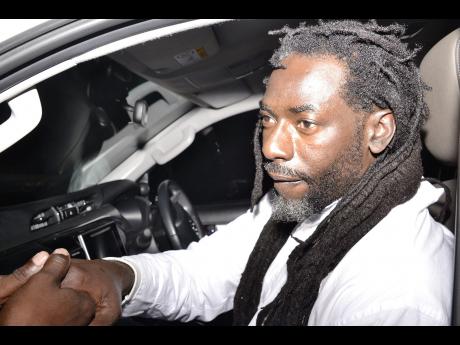Scores of Jamaicans were eagerly awaiting Banton’s arrival in the island as they camped out at the Norman Manley International Airport last Friday to welcome ‘The Gargamel’ home.
Home. A foreign word for the Untold Stories singer, who has spent close to a decade at the United States-based McRae Correctional Facility on drug-related charges. His release is also being celebrated by African organisation Ujamaa, hosts of an all-weekend vigil, including drummers and dancers, to commemorate Banton’s homecoming. For Professor Donna Hope, the outflow of love and support for Banton speaks volumes to the impact of his music and personal life.
“For many people, Buju Banton is like the prodigal son returning to the fold,” Hope told The Gleaner.
“We have been waiting on his return with bated breath, and there is a lot of outpouring of affection from people of different strands – working-class people, garrison people, ordinary people, Rastafari, reggae celebrants … because of the type of person and artiste he has been.
“For many of us, he has represented one of the best parts of ourselves through the music. We celebrated our lives through his music because he allowed us to celebrate who we were, and so, it’s a personal journey for many people, which is why you’ll find these different strands of individuals getting involved.”
Not An Easy Road
Though Banton started recording music as a teenager, he attained mainstream prominence in 1992 with the release of his debut album Mr Mention. The 15-track set broke Bob Marley’s record for the most number one singles in a single year, some of which were How the World A Run, Love Me Browning and Have to Get You Tonight. His success continued even after transitioning to the Rastafarian faith where he released conscious tracks like Untold Stories, Murderer and ‘Til I’m Laid to Rest,all part of Banton’s 1994 acclaimed ‘Til Shiloh album. But his career was also riddled with controversy, with gay rights activists calling for the ban of the deejay and his music in different territories.
“Buju Banton has been a very militant man. He has stood his ground and held his own,” Hope said.
“Many of us were disappointed when he fell in that way because we saw it as a fall from grace. He has paid the price and we welcome him one of our prophets – with open arms. He is still a seminal figure, an individual who represents the best of many of us in Jamaica through music and life and the way he rose from poverty to become an internationally celebrated and recognised man and musical icon.”
She described his homecoming as a joyous occasion.
“It comes at a time when Jamaicans are preparing for what is usually one of the greatest celebrations as we still celebrate Christmas in Jamaica. Buju coming home is adding to the icing to the kind of Christmas celebrations Jamaicans would usually have.
It’s one of those things that causes you to hold back the tears. I want him to just spend some time re-entering Jamaica and reintegrating into society and in the music industry, [then] take up the mantel and continue with his music career and with his cultural work because we still love Buju Banton, we really love him.”
Dr Sonjah Stanley Niaah also spoke highly of the deejay.
“Buju Banton is one of Jamaica’s most beloved artistes, one who has been compared to Bob Marley and who had a meteoric rise in dancehall and eventually reggae prominence with record No I hits,” she said. “His temporary fall from glory was a devastating moment for many fans at home and abroad, but his return after serving time is nothing short of a return of the prodigal son.”





